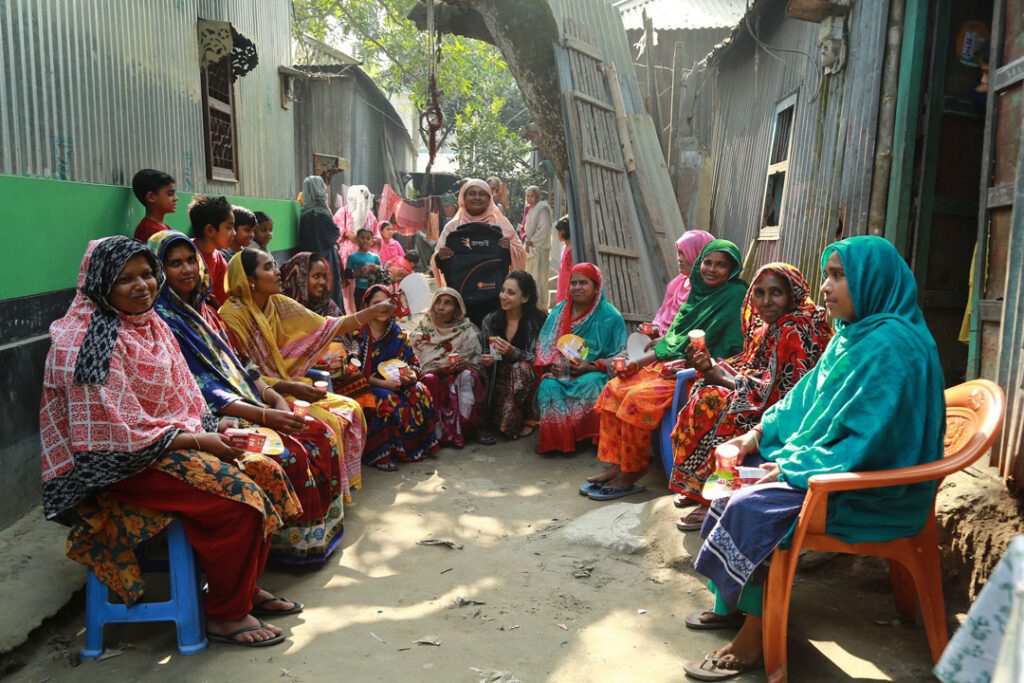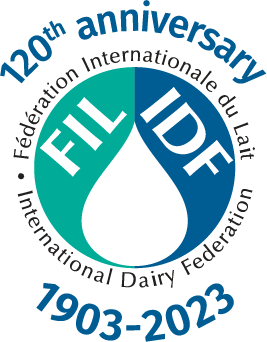Share this page


Alignment with SDGs
AUTHOR
Irene Quist Mortensen Arla Foods, Aarhus • Denmark
Abstract
In a country in which 56% of children are underweight and malnutrition is prevalent, Arla is determined to give everyone in Bangladesh access to affordable, nutritious dairy products. This was the inspiration behind the development of Dano® Daily Pushti – fortified filled milk powder, in 20-gram sachets, at an affordable price. The product is the first of its kind in Bangladesh. Reaching consumers in the country’s cities proved straightforward but with almost 70% of the population residing in the rural and remote areas, coupled with poor infrastructures and limited distribution networks, an innovative, alternative sales model was called for. Equipped with Dano Daily Pushti sachets in their backpacks, a growing team of female microentrepreneurs is being enabled to reach people in rural parts of the country.
These determined, driven women are not only gaining knowledge and an accreditation through training, crucially, they are securing a reliable income, helping lift them out of poverty.
They are known as Arla’s Pushti ambassadors and, as well as selling products, the women conduct courtyard sessions to educate people about health and milk nutrition generally.
The four-year project started operating in 2019, with the ambition to scale up to 5,000 female micro-entrepreneurs reaching 1.25 million new consumers by 2023. The project now includes more than 200 entrepreneurs.
The project is supported by the Danish Ministry of Foreign Affairs and is a partnership between the Dutch-based NGO, BopInc; Bangladesh based NGOs, dNet and a social enterprise called iSocial.
Introduction
22 million people in Bangladesh live below the poverty line, 56% of children are underweight and malnutrition is prevalent; the job creation pace is slow and female labor force participation is lagging and skills to meet labour market demands are inadequate. Demand for dairy products in Bangladesh also currently exceeds availability.
In October 2015, Arla Foods Bangladesh introduced a new, first of its kind filled milk powder in a 20 grams sachet named Dano® Daily Pushti to be sold at an attractive price point. During 2015 and 2016, Arla conducted in-depth studies in Bangladesh to investigate consumer behavior, local dairy sector development, and to assess human rights risks related to scaling-up Dano® Daily Pushti. Despite the success in terms of sales volume, it became clear that alternative distribution channels were required to reach non-urban low-income consumers who have the strongest need for better access to affordable nutrition.
Currently almost 70% of population resides in the rural and remote parts of Bangladesh which is an untapped market for Arla. By expanding the consumer base through innovative distribution mechanisms and sales penetration to rural consumers, more and better jobs are created in the dairy value chain.
This saw the development of Arla’s Pushti ambassador network – a team of female microentrepreneurs. These determined women are not only gaining knowledge and accreditation through Arla’s training programme, they are also securing access to a reliable income, helping to lift them out of poverty. In addition to selling products in the rural areas of Bangladesh, these women conduct courtyard sessions to educate people about health and milk nutrition generally.
The ambassadors are being mobilised through Arla’s partnerships with the Dutch-based NGO BoP Innovation Centre and in Bangladesh with the NGO dNet and social enterprise iSocial.
Arla’s motivation to collaborate in the programme lies at the heart of its vision and strategy, which sees the company committing to contribute positively to the societies in which it operates as behaving responsibly is an inherent part of Arla’s culture. Arla recognises the opportunity it has to help address Bangladesh’s high rates of malnutrition and to do so in a sustainable way, whilst having the additional benefit of creating employment opportunities for 5,000 female micro-entrepreneurs over the coming years and enabling them to generate their income.
Advancing women’s initiative
The four-year project started operating in 2019, with the ambition to scale up to 5,000 female micro-entrepreneurs reaching 1.25 million new consumers by 2023.
Due to COVID-19, the project implementation has been delayed and the results of the proof-of-concept phase, where the project model is tested in six hubs, still remains to be documented. However, despite COVID-19 and major floods, the female ambassadors succeeded in changing sales methods and thereby increased sales to improve nutrition in rural Bangladesh.
The project now includes more than 300 entrepreneurs and despite the COVID-19 setbacks, our ambition to reach 5,000 female microentrepreneurs remains.
Dairy transforms the lives of individuals, families, communities, and entire populations.
Irene Quist Mortensen Tweet
An opportunity out of poverty
The main beneficiaries of this programme are: 5000 low-income females who have been presented the opportunity to lift themselves out of poverty through training to enable them to gain an accreditation to become as sales agents and generate their own income, through selling, among other products Arla Dano Daily Pushti.
1.25 million low-income consumers in rural and remote areas are being given access to affordable, nutritious dairy products they wouldn’t normally have access to.
Having currently recruited more than 300 entrepreneurs, next step is to continue to extend rural distribution networks using innovative tools with the ambition to scale up to 5,000 female micro-entrepreneurs reaching 1.25 million new consumers by 2023.
Looking ahead to the future, the success of Dano Daily Pushti is inspiring Arla to develop new, nutritious products for low-income consumers to add to the baskets of our ambassadors. We have recently funded a systematic literature study investigating intake of nutrients, food preferences and nutritional status among the population in Bangladesh, as a first step to doing so.
Similarly, it is crucial for the sustainability of the sales network that the agents are adequately equipped with market relevant skills to become successful entrepreneurs. In an ideal scenario, talented entrepreneurs will recruit own teams, advance to senior roles, start-up their own shops in the community or seek formal employment elsewhere. This will sustain the development impact on the female sales agents and their related households on a longer term.
A sustainable business model
If the programme is successful in recruiting a fully equipped and profitable female sales force of 5,000 by the end of 2023, Arla and its partners will be in a position to roll out the operation on a purely commercial basis, independent of the external funding support it currently receives. This will create a sustainable sales network of female entrepreneurs with more, better and inclusive jobs on a long-term basis and continued access to affordable nutrition to Bangladesh’s low income, rural population.
The development of a successful and innovative model for last mile distribution also provides Arla with a blue print to potentially replicate in other emerging markets.






